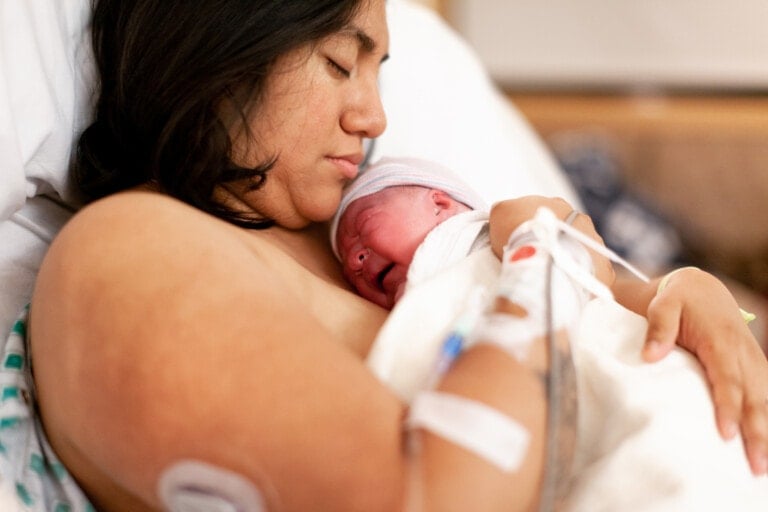It’s typical for pregnant women to make plans for how they will deliver and care for their newborns. Toward the end of pregnancy, most women can answer questions such as, “Do you plan to breastfeed or formula feed your baby?” or “How long will you be able to take off work for your maternity leave?” However, questions about postpartum recovery, such as, “What physical changes do you expect to go through after giving birth?” or “If you struggle with breastfeeding, how will you get help?” can be much more difficult for pregnant women to answer.
This emphasis on prioritizing the needs of newborn babies over their mothers’ needs in our culture can be attributed to a lack of awareness about the importance of the postpartum period for mothers’ recovery and healing. This period of time has recently been coined the “first 42 days.”
Why Postpartum Preparedness is Important
Aeroflow Breastpump’s recent survey about postpartum recovery highlighted women’s lack of education and resources for postpartum life.1 In this survey of 394 U.S. mothers, almost half admitted feeling unprepared for what to expect and how to care for their bodies in the first six postpartum weeks. In addition, two-thirds of them believed that the postpartum period was more difficult than anticipated.
Postpartum struggles were common and included problems with breastfeeding (66%), postpartum depression or postpartum anxiety (48%), lack of social support/isolation (39%), newborn care (28%), and complications/concerns with postpartum healing (24%). Overall, 90% of survey respondents felt that the current system of educating mothers about what to expect during the postpartum period and available resources needs to be improved.
The first 42 days are a period of great physical, mental, and emotional transition for new mothers. Therefore, women need to educate themselves about what to expect during this period, including the following:
- Physical changes can include some combination of uterine cramping, vaginal and rectal soreness and pain, breast pain, edema (swelling of extremities), and problems with bladder control. Postpartum hormonal shifts can also lead to night sweats, interfering with sleep.
- Mothers who deliver by C-section are at risk of post-surgical complications such as wound healing and infections.
- Breastfeeding mothers may experience additional discomforts related to engorgement, latching problems, and uterine cramps due to hormones released during lactation. Breastfeeding problems can also be a source of significant stress and anxiety for new moms.
- Emotional and mood changes due to hormonal shifts. The “baby blues” are feelings of sadness that start in the first 3-4 days after delivery and resolve by the end of the second postpartum week. Feelings of sadness, hopelessness, and/or stress that start more than two weeks after birth are a red flag for a postpartum mental health disorder, such as depression or anxiety.
How to Prepare for the Postpartum Period
Pregnant women must learn about resources to help them heal and recover from childbirth. This is evidenced by additional findings in Aeroflow’s survey demonstrating that over 75% of new moms reported not being given any information or guidance about medical devices that may help with recovery. In addition, 25% reported not having access to the necessary care to address their struggles during their postpartum recoveries.1
Preparation for a mother’s recovery during the first 42 days may include the following:
Stock up on supplies.
Stocking up on postpartum recovery supplies ahead of time. These include pads, peri bottles, Sitz bath basins, stool softeners, comfortable, loose-fitting clothing, and breastfeeding supplies (breast pads, lanolin cream, nursing bras, nursing pillows, and a breast pump if needed). Medical devices that can help with recovery include FDA-approved postpartum recovery support garments.
Educate yourself about physical changes.
Learn to tell the difference between normal physical changes and abnormal symptoms. Concerning symptoms that require medical attention (i.e., a call to one’s OB/GYN or midwife) include passing large blood clots (golf ball size or larger), soaking through a thick pad in less than one hour, developing a fever, having worsening leg swelling, or feeling like one might have a postpartum mental health problem.
Arrange for plenty of help.
Arrange for help during the postpartum period ahead of time. This can include asking friends and loved ones to prepare meals, help with housework, laundry, and yard work, and assist with childcare. Postpartum doulas can also be an excellent source of support and help with newborn care and household tasks so new moms can get some rest.
Plan to give yourself grace.
Make sure to have realistic expectations for recovery and newborn care. Prepare to not be too hard on yourself if newborn care, breastfeeding, weight loss, plans to be productive on maternity leave, etc., do not go as planned or desired.
Sign up for support groups.
Learn about resources for moms. These include support groups for new moms (in-person and online), lactation and breastfeeding support sources, researching counselors and therapists specializing in maternal mental health, postpartum recovery programs, books, and exploring websites focusing on postpartum recovery, new motherhood, and the first 42 days.
Don’t forget to schedule self-care.
Recognizing the importance of making time for “postpartum self-care.” Taking small, frequent breaks for activities like walking, reading, getting outside, taking a bath, etc., can significantly impact mothers’ overall health, well-being, and postpartum recovery journeys.
In conclusion, the first 42 days are one of the most significant transitions of a woman’s life. Therefore, pregnant women need to be educated and prepared for this transition ahead of time to have the resources in place to prioritize their recovery, rest, healing, and well-being, as well as that of their babies.






























